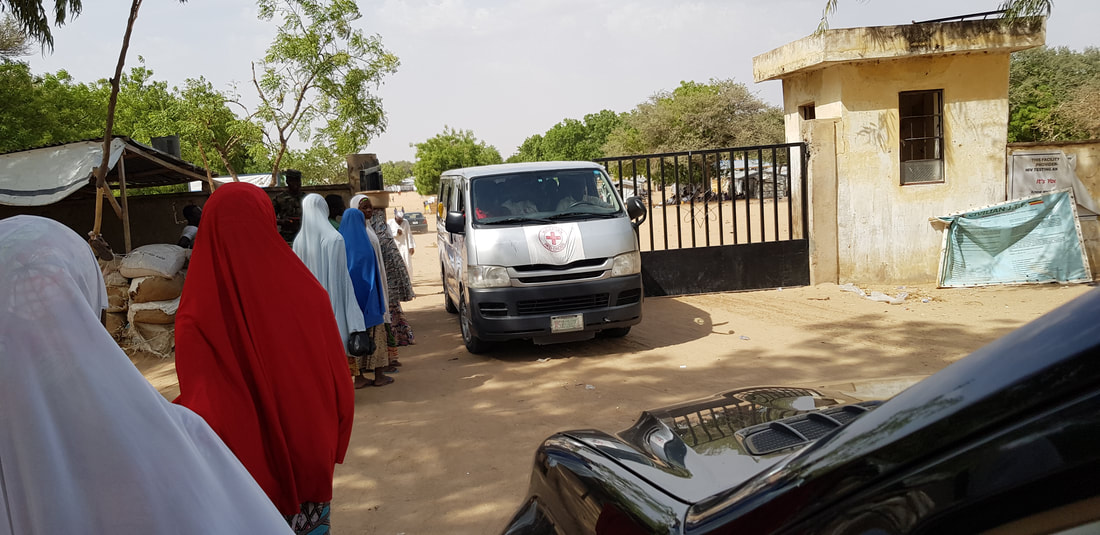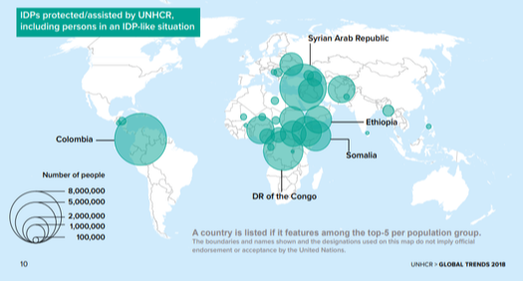|
Article researched and written by Josephine Okojie & edited by Zufi Deo. Internally displaced people do not get the same attention as their other refugee counter parts. Partially because they are excluded from the official definition of a refugee. (Official definition of UNHCR is here. ) They have not crossed an international border so are not classed as refugees even though they have the same experience of displacement as refugees. They experience the same concerns of social exclusion and poverty premium, for example. In most cases they speak a different language and are considered aliens - even though they have not crossed an international border. This is the experience of Saidu & Muhammed two internally displaced people from Nigeria. Entrance to the Dalor Camp at the outskirt of Maiduguri, Borno state, Nigeria. Saidu Musa - farmer turned refugeeSaidu Bala Musa, a farmer in Buni Yadi, Gujba LGA, Yobe State, used to plant various crops such as rice, guinea corn, beans, and sesame. Before the security crisis in Borno, Musa got 50 bags of sesame and 40 bags of rice from his over 10 hectares of land. His community was attacked by Boko Haram militants and he was forced to flee for safety. "When we left here, we were about to harvest our crops," he says. "I had four farms then, which were all ready to be harvested and all necessary plans and work had been done. But that was how I left everything behind. We did not even reap from our crops, much less use them, and when we came there was nothing," he says. "Our houses had been destroyed beyond habitable condition. My family and I had to move into the camp because we had nowhere else to go," he adds. Upon his return home, Musa did not find anything from what he left behind as everything was destroyed during the unrest. He and his family had to move into the refugee camp at Dalori, at the outskirts of Maiduguri. He hopes to return back to his community in Yobe as peace has gradually returned to the place but lack of capital has continued to deter him from doing so. "I want to leave the camp and returned home, but my only problem is the finance to kick-start my farming business. I need to buy inputs to farm and take care of my family," he says. Muhammad Lawan - another farmer turned refugeeMuhammad Lawan is a farmer who now lives in the IDP camp at on the highway from Potiskum to Buni-Yadi. Narrating his experience of fleeing his community during the peak of the crisis, Lawan says he felt sad because he was leaving his entire investment but had to secure his life first. "I have estimated my yield and the income I would generate, but when the crisis started I left all behind to flee for safety, and on returning, I did not meet a single thing on my farm," Lawan says. "It is very disheartening because where we fled, we had nothing there, and as a farmer your farm is your investment and this accounts for the major reason why we were all incapacitated," he adds. There are another 1.7m people across Nigeria in a similar position across Nigeria. Lawan and Musa's cases give an insight into the situation of most entrepreneurs in the various IDPs camp across the country who became refugees for survival. If adequately empowered with the resources, these entrepreneurs will return to their business ventures and would be reintegrated into the society. Decades of insecurity in the North-East region of Nigeria has displaced thousands of entrepreneurs. From food vendors and shoe cobblers to farmers and hair dressers. These small businesses were forced to close shops as the conflicts in the region escalated, with many fleeing for safety. The situation has thwarted the region's economic growth and development, lives and properties worth millions of naira are being destroyed during the unrest, forcing many to live in refugee camps. As peace is gradually returning to the region, these entrepreneurs are eager to return to their ventures but are limited by resources. Experts say with adequate support, these refugees will be re-integrated into the society through entrepreneurship. They note that such programmes should concentrate resources on increasing production, manufacturing and service activities, supporting markets and establishing a 'business incubator' to foment private sector development with a social component—In other words, the development of small enterprises that create employment and wealth for refugees and the local community. The top 5 countries with IDP’sAccording to UNHCR there are an estimated 41.3m Internally displaced globally. (Source: UNHCR Report, 2018.) Nigeria is number 6 globally as a country with the most numbers of IDP’s. This figure below highlights their distribution across world. The top 5 countries with IDP’s are:
(Source: Global Trends Forced Displacement 2018, UNHCR). For more details you can access the full report here. About BizGees -
BizGees is transforming refugees into entrepreneurs using FinTech. We won the Infosys Challenge for financial inclusion at the UNICEF FinTech Jam for Good 2016 in London. They have received support from programs like F-10 Fintech Accelerator program, Zurich, Pitch@Palace program, London and Xynteo Innovation Exchange, Oslo. We currently support two communities: 1. Members of the Lira tribe in Northern Uganda who are from $5 a day communities. The lLra tribe is spread across multiple countries and experienced displacement during the 1908’s. They are still struggling to pick themselves up and take ownership of their own lives. 2. Artisans from the Swat Valley, Pakistan. The Swat Valley a region 2.5 million people was taken over by the taliban and during the counter insurgency efforts the entire region was evacuated. You can support these communities here. About Josephine Okojie - Josephine is based in Nigeria. She is an experienced Economist and Researcher with over three years coverage of key sectors, markets, trends and indicators across Nigeria and West Africa economies. She is a finance and agro analyst at BusinessDay Media . She has researched and written this article during her time as a volunteer with BizGees.
1 Comment
|



 RSS Feed
RSS Feed

